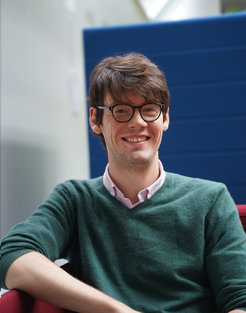How does Evolution Produce Biochemical Diversity?
New Max-Planck Research Group at MPIterMic
Scientists born in Germany usually have to learn to communicate their research in English. Georg Hochberg, on the contrary, has spent the last 12 years in England and the USA. There, his scientific journey took him from physical physics and evolutionary sciences to microbiology. As a new Max Planck Research Group Leader at the Marburg MPI he now wants to elucidate the evolution of protein complex over the coming years.

Protein complexes are the workhorses of the cell and they are involved in almost all elementary metabolic processes. Protein complexes often consist of several individual protein subunits that are assembled within precise geometric forms. "Understanding the evolution of such complexes," says Hochberg, "raises mayor, elementary questions of evolutionary biology, such as: Is complexity always useful, or do useless structures emerge in evolution that have either never had a benefit or have long since lost it?”
The scientist hopes that the evolution of protein complexes will provide answers to these fundamental questions. The problem is that protein complexes do not leave behind fossils and their evolutionary history is therefore largely unknown. Nevertheless, the protein sequences of today's complexes bear traces of their ancestors. Using this information, Hochberg infers the sequences of ancient protein complexes that existed hundreds of millions of years ago in order to resurrect them in the laboratory and uncover their evolutionary history.
What can we learn from these ancient proteins? Hochberg suspects that chance has played a major role in their evolution, but he does not want to commit himself to overly accurate predictions: „Nature is under no obligation to organize itself according to our expectations“, says Hochberg.
The Marburg institute attracted Hochberg for its fruitful collaboration of biochemists from the MPI, the university and synthetic microbiology and their expertise in individual metabolic properties and functions. His dream would be to elucidate the evolution of larger functional protein complexes such as flagella or nuclear pores. Until then, it will be necessary to understand the basic principles of molecular evolution. Hochberg is currently putting together a research team in order to achieve this goal.












